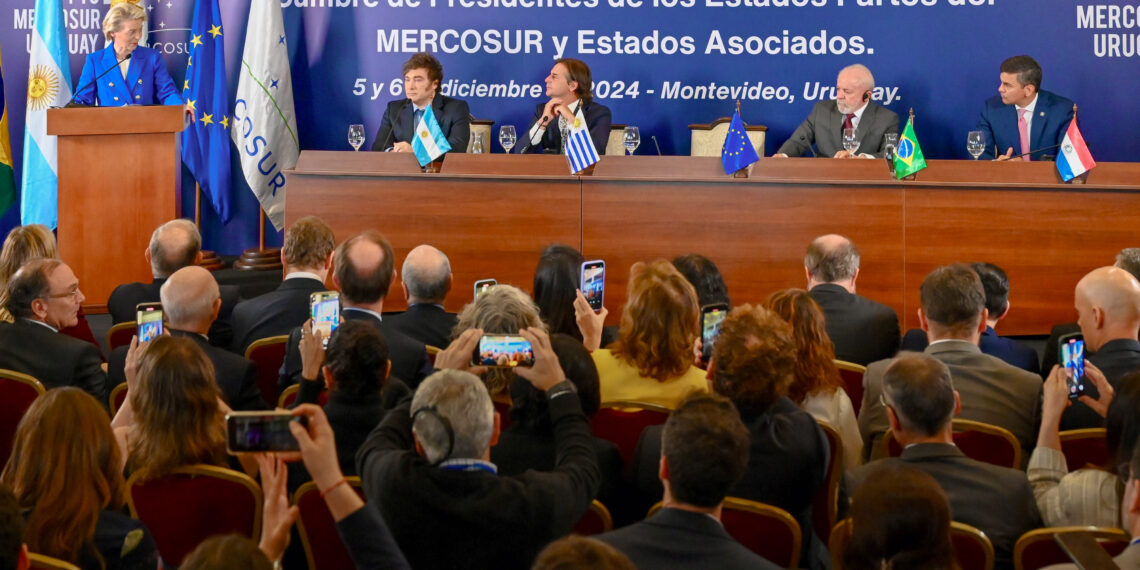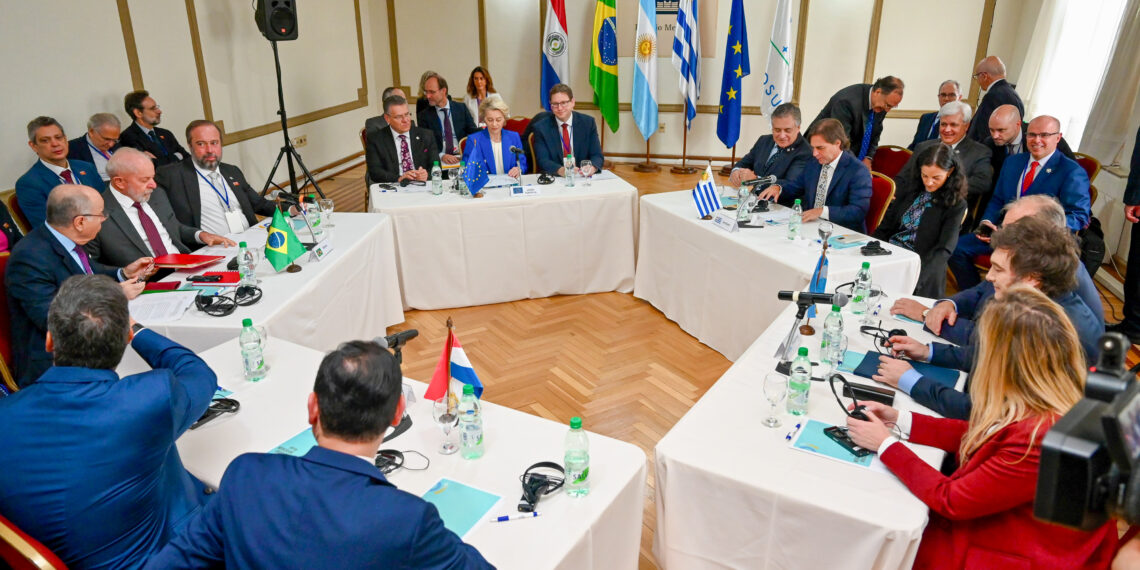Brussels – The EU-Mercosur free trade agreement is history. Ursula von der Leyen’s blitz in Montevideo is a success. On the sidelines of the conclusion of the flash negotiations with the leaders of Argentina, Brazil, Uruguay and Paraguay that closed a quarter-century-long negotiation, European Commission President Ursula von der Leyen called it a “historic milestone.”
The announcement was given at a brief press conference (with no opportunity to ask questions) along with the four counterparts, Brazilian President Lula, Argentina’s Javier Milei, Paraguay’s Santiago Peña, and host Lacalle Pou. After 25 years of negotiations and a political agreement reached and set aside in 2019, the signing finally arrived. An “ambitious and balanced” agreement, according to von der Leyen. An agreement that “is not just an economic opportunity” but “a political necessity” in an increasingly competitive and aggressive geopolitical environment. “We show that democracies can rely on each other,” said the EU leader.

The EU-Mercosur agreement opens the door to a market of over 700 million consumers. The EU guarantees itself entry to a market that is still highly protected through the gradual dismantling of duties on exports to Mercosur of cheese and dairy products, wine, spirits, and chocolate, as well as cars and machinery, clothing, and footwear. It also gets its hands on the huge reservoir of strategic minerals crucial for the green transition on the Andean continent.
Von der Leyen directly addressed the “60,000 European companies, including 30,000 SMEs, who will “benefit from reduced tariffs and simplified procedures” thanks to opening markets with the four Latin countries. In particular, the president sent a message to European farmers, who strongly oppose an agreement threatening to bring the entire sector to its knees. “We have listened to your concerns, and we are taking action,” she said, assuring that the EU-Mercosur agreement “includes robust safeguards to protect” producers in EU countries and “European food standards are not touched.”
On her return from Montevideo, von der Leyen will have to deal with member countries. In particular with French President Emmanuel Macron, who also yesterday called the agreement “unacceptable.” In a post on X, the president said, “Now I look forward to discussing it with the EU countries.” Strengthened by the support of Germany and Spain, the EU leader will have to convince the more reticent governments—besides France, the other stumbling blocks to be overcome for the agreement not to be blocked are Italy, Poland, Belgium, and Ireland—that the “yes” wrested from Lula and the other South Americans today is subject to much more advantageous conditions than those outlined in 2019.
EU-Mercosur 2.0: the new terms of the Agreement
“This is a brand new agreement,” a senior EU official said today, in which ‘all concerns expressed have been listened to carefully’. According to the European Commission, the capitals’ grievances would relate to the terms of the five-year-old political agreement “because it is the only one they know”. It will only be possible to do the maths from the beginning of next week when the EU executive will publish the new elements of the agreement and discuss them with the EU Council and the Parliament.
First, sources close to the negotiations reveal that the new EU-Mercosur “includes the Paris Agreement on climate change as an essential element.” This means that both parties will have the option to “suspend in part or in full” the trade agreement benefits if one of them were to renege on the climate commitments made in 2015. It also includes a binding commitment to take measures to halt deforestation starting in 2030.
But it is not on the actual commitment of the four Mercosur countries to the fight against climate change that Paris, Rome, and Warsaw turn up their noses. It is because France, Italy, and Poland have a very strong agricultural-industrial sector, the sector most at risk from the opening of the European market to South American agricultural products, beef and poultry. Von der Leyen’s negotiating team was able to bring home a series of “bilateral safeguards that can be activated to protect specific agricultural sectors.”
In particular, products entering the single market must comply with EU sanitary standards and phytosanitary measures. “No compromise on this point,” guarantees a senior European official. The issue of production standards is more complex because “you cannot impose your own rules of work organisation on your partners.” To ensure the protection of specific crops in the event of market distortions, the EU-Mercosur agreement would grant the possibility of suspending “also at the national level” the dismantling of duties for a temporary period. Moreover, the Commission “intends to set up a €1 billion reserve to be drawn on” to buffer any losses for farmers. However, according to sources, “there are several guarantees that the market will not be disturbed.” After all, the example Brussels gives is that if you look at beef imports from Latin America, it is only 1.6 per cent of total consumption in the EU.
Mercosur also asserted its demands. Compared to what was agreed in 2019, Argentina, Brazil, Uruguay, and Paraguay “asked for more policy space to maintain and develop their national industrial base”. More flexibility, in short, is granted through “a rebalancing mechanism”—based on what is envisaged at the WTO level—whereby the parties can call on an external body to verify whether a given measure taken by the partner “nullifies or substantially reduces the benefits” of the agreement. If so, “the complaining party may take rebalancing measures.”

The EU then agreed to change the phase-out for electric and hybrid vehicles from 15 to 18 years in exchange for a larger initial reduction. In general, with regard to vehicles, safeguard clauses “subject to a more flexible activation” than for other goods were introduced to meet Mercosur’s concerns. Brussels obtained zero duties on imports of industrial raw materials from Argentina and imports of nickel, aluminium, steel, and titanium from Brazil. With Javier Milei, “some policy space was agreed for agricultural products due to Argentina’s difficult budgetary situation.”
Brussels confident: “The best possible result.” Now, the uncertainty over ratification
One thing is sure: A winning deal, you don’t change it. “The text is the result of hard negotiations over 25 years and very intensive negotiations over the last six to nine months: it is the best possible result,” says a senior EU official. There is no going back, and it is now up to the European Commission to “explain exactly what the text means” to member states and MEPs.
The months needed to finalise the agreement’s translations and iron out some bureaucratic quibbles come to the rescue of the European Commission, which will be able to feel any new resistance from the member states and impose the most advantageous ratification process on them. “The Commission will decide the position on ratification when the time comes,” the responsible spokesman, Olof Gill, confirmed today.
Mixed agreements, which involve the competencies of the EU and those of the member states, are subject to approval by both the EU Council—unanimously—and the EU Parliament, as well as ratification in all national parliaments. However, the EU executive could force the hand and try to pass the deal as a mere trade agreement, avoiding the risky passage through the member states’ parliaments: it would only require a qualified majority of the EU capitals in favour.
English version by the Translation Service of Withub

![Bernd Lange, presidente della commissione Commercio internazionale del Parlamento europeo [foto: European Parliament]](https://www.eunews.it/wp-content/uploads/2024/12/lange-350x250.jpg)
![Trattori, proteste e critiche degli agricoltori per l'intenzione di chiudere l'accordo Ue-Mercosur [Bruxelles, 13 novembre 2024. Foto: Emanuele Bonini]](https://www.eunews.it/wp-content/uploads/2024/11/fugea241113-350x250.jpeg)




![Nicola Procaccini, co-presidente del gruppo Ecr [Strasburgo, 11 febbraio 2025. Foto: ]](https://www.eunews.it/wp-content/uploads/2025/02/procaccini-120x86.png)